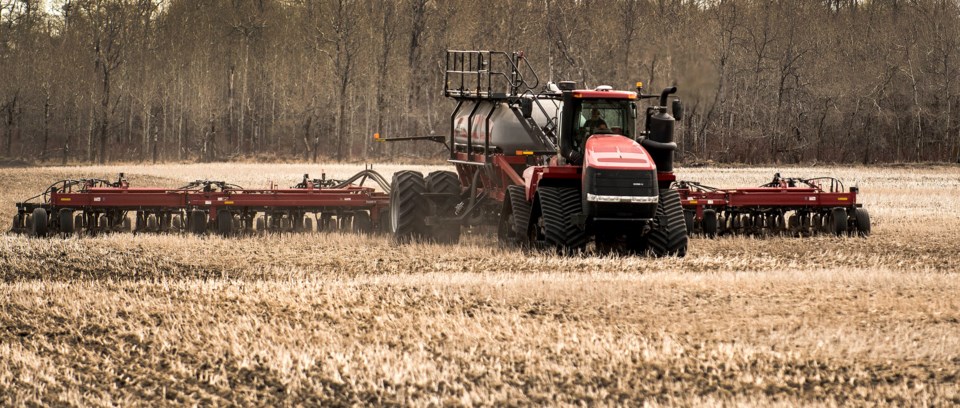Alberta farmers took home about 70 per cent less cash last year due to high costs and low prices, says Statistics Canada, and this year is shaping up to be even worse.
A report from Statistics Canada released last week found Canadian farmers saw a roughly 45-per-cent drop in realized net income (cash after costs and depreciation) last year – the biggest one-year drop since 2006. Alberta farmers saw their incomes plummet roughly 68 per cent to about $535,062, down from about $1.7 million in 2017.
The big problem in this region was the weather, said John Guelly, chair of the Alberta Canola Producers Commission and Sturgeon County’s representative with the group. Smoke from B.C.’s forest fires effectively shut down plant growth for three weeks in August, so many crops weren’t mature by the time that mid-September snow dump killed them off.
Two more snowfalls stomped crops flat, making them tougher to collect, and left them sopping wet, which meant more time and money spent drying them out, Guelly continued. The upshot was a lower-quality crop that was more expensive to harvest.
Ron Krywko, who’s grown grain west of Morinville for about 35 years, said he lucked out and dodged many of the weather-related challenges farmers faced last year. Still, he did see a roughly 10-per-cent hike in his expenses and lower prices overall.
“The last three harvests have been very challenging for agriculture,” he said, and some of the worst he’s seen in his career.
Alberta farmers saw a roughly four-per-cent drop in sales (farm cash receipts) last year, with canola sales plummeting about 16 per cent, Statistics Canada found. Expenses, meanwhile, rose 6.5 per cent nation-wide – the biggest increase in six years – due to the cost of feed, fuel and interest payments.
Worse this year?
Walter Tappauf, who farms west of St. Albert, said he actually had a pretty average harvest last year, and that many Sturgeon farmers got off relatively easy compared to the rest of the province.
This year could be a lot worse, though.
“2019 is building up to be a wreck for farmers,” Tappauf said, primarily because of China, which has more or less shut down imports of Canadian canola seed over what are supposedly quality concerns – many analysts say it is actually due to a diplomatic dispute over the arrest of Huawei executive Meng Wanzhou.
“China buys 40 per cent of our canola. That’s a big hit to farmers in Canada.”
It’s also been pretty dry in these parts, Tappauf noted. The May 28 crop report from Alberta Agriculture found half of the northwest region (which includes Sturgeon) was in fair to poor condition in terms of soil moisture, with just 48 per cent ranked as “good.” Large swaths of northern and southern Alberta were the driest they’ve been in decades.
There’s no end in sight for the canola dispute, although there could be some kind of breakthrough at the G20 meeting in Japan this month, Guelly said. Farmers might have to buy more canola storage bins if this keeps up. India has also clamped down on pea imports, while Italy has slapped taxes on imported durum wheat.
“There’s so much uncertainty with trade that we don’t know what to expect,” Guelly said.
Most farmers this year would pull back on new equipment and try to diversify their operations to respond to these pressures, Guelly said.
It’s stressful and depressing, especially coming off three tough harvests in a row, Krywko said.
“It takes a lot of the enjoyment out of agriculture.”




